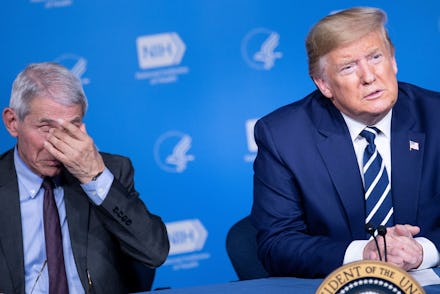Trump breaks with global health officials on coronavirus based on a "hunch"

With nearly 130 cases of the newest, deadly coronavirus strain confirmed in the United States so far, the Trump administration has spent the past week desperately scrambling to reassure a panicked public that they have the situation well under control. To date, they've not done a great job.
In part, the White House's bungled response has been a direct result of any number of bureaucratic decisions which have hampered an effective mobilization of federal resources to address the outbreak. But while budget cuts and conspicuous staffing absences may be partially to blame for our current viral predicament, there is perhaps no clearer or more present danger to public health than President Trump himself.
Despite being neither a doctor, nor a particularly healthy person in general, Trump has nevertheless opted to declare that the scientific consensus on the viral COVID-19 outbreak overblown. His assessments, he said, are based on his "hunch" that things are actually much better than what the professionals who study these sorts of things for a living are saying.
While doctors at the World Health Organization have put the global death rate from the coronavirus at 3.4%, Trump on Wednesday insisted to unofficial White House adviser and Fox News host Sean Hannity that he "personally" believed the rate to be "way under 1%."
"Well, I think the 3.4% is really a false number," Trump — who, again, is not a doctor nor a scientist — insisted.
He continued:
Now, and this is just my hunch, but based on a lot of conversations with a lot of people that do this. Because a lot people will have this and it's very mild. They'll get better very rapidly. They don't even see a doctor. They don't even call a doctor.
Trump later claimed that those who have a mild case of the "corona flu" often go to work, concluding that "you never hear about those people." Doctors have advised that people who feel ill should not go to work, school, or other common gathering places so as to avoid community spread.
Let's be clear here: This is not Trump simply describing the state of things, as he later claimed to be doing. This is Trump actively trying to downplay the severity of a disease which has killed more than 3,000 people worldwide so far. It is, as others have pointed out, the president of the United States attempting to will into existence a solution to a global health crisis simply by saying that everything's a-okay, and that any problems with his government's response are someone else's fault.
As Susan Hennessey and Benjamin Wittes wrote for The New York Times in January, Trump believes "that the purpose of executive power is to serve the individual interests of the president. It serves the public good only coincidentally and only when convenient." A sprawling global pandemic making its way to the U.S., where it poses a real threat due to our deeply flawed health care system, is not good for the president. So he uses his powers of messaging as the nation's leader to say it's not a big deal.
Meanwhile, lives, and the public's faith in the government's ability to fulfill its most basic obligation of simply keeping people alive, hang in the balance.